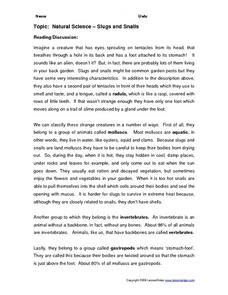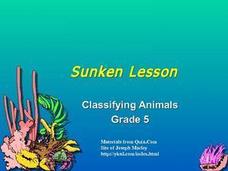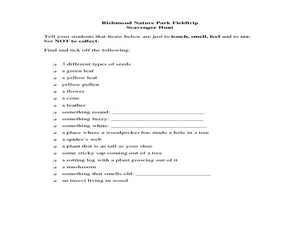Curated OER
Classification of an Invertebrate: Sponge
Students investigate the invertebrate sponge. In this invertebrates lesson plan, students observe the sponge, Grantia, using a dissecting microscope. Students answer questions about their observations and view six other invertebrates....
Curated OER
Slugs and Snails
Slugs and snails are the focus of this life science worksheet. Student read a selection on these animals, then answer ten comprehension questions. Then, students must draw an "alien portrait" using the characteristics of slugs and snails...
Curated OER
Life Cycle: Diversity in a Balance
In this life cycle workbook, 3rd graders complete several different activities in which they analyze different invertebrates, identify arthropods, examine human biology and plants, and study natural environments. 20 different activities...
Curated OER
Invertebrates
In this science activity, students answer the problems that are related to the concept of invertebrates. The first question has the ordering of and sorting of invertebrates.
Curated OER
Animals, Soil, Trees
Fourth graders describe the various kinds of soils and how plants and animals are affected by them. They describe the baic needs of plants, scoring at least a 3 or 4 on a 4-point rubic. Students are able to predict and/or infer what...
Curated OER
Through the Eyes of an Owl
Students describe vertebrates in terms of observable body parts and characteristics and describe life cycles of familiar organisms. They identify familiar organisms as part of a food chain or food web and describe their feeding...
Curated OER
An Episode on Australian Animals
Fifth graders identify and analyze various ecological regions of Australia in order to identify more about some of the animals that inhabit the area. Students record information they discover on a chart provided that is assessed at end...
Curated OER
TE Lesson: How Clean is that Water?
Students examine the factors the affect water quality, and allow for animals and plants to live. They look at how engineers apply water quality information when making stream modifications in order to ensure drinking water quality. They...
Alabama Learning Exchange
Vertebrates or Invertebrates
Examine the differences between vertebrates and invertebrates as learners conduct Internet research, take an online invertebrate quiz, complete a vertebrate fact sheet, print out pictures of invertebrates they find interesting, and...
Curated OER
Invertebrates, No Backbone, No Problem
Third graders research an invertebrate, create a poster about it, then present it to the class.
Curated OER
Hunting Invertebrate Fossils in the Classroom
Students acquire a general knowledge of fossils and paleontology, the study of evidence of life in the past and identify the major invertebrate groups (phyla) commonly found in the fossil record.
Curated OER
Sunken Lesson: Classifying Animals
This PowerPoint features vocabulary and key concepts related to animal classification. Information about levels of classification, traits common to vertebrates and invertebrates, and a description of metamorphosis are included. The text...
Curated OER
Mighty Macroinvertebrates
Seventh graders identify the names and features of macroinvertebrates found in Turtle River. In this ecology lesson students use digital microscopes and take pictures of invertebrates.
Curated OER
Out and About: Minibeasts
Pupils get up close and personal with invertebrates. In this mini-beasts lesson, students may visit the Natural History Museum, the Bramley Frith Education Centre, the Edinburgh Butterfly and Insect World online or in-person to discover...
Curated OER
Biology Trivia
In this biology trivia worksheet, students write short answers to 101 questions about animal classification, human anatomy, animal facts, and attributes of organisms.
Curated OER
Invertebrate Classification Challenge
Sixth graders practice invertebrate classification using the organisms that are discussed in their textbooks. In this classification lesson students work in teams to classify organisms.
Curated OER
Observing Compost Invertebrates
Second graders examine compost piles and what invertebrates help decompose the organic matter. In this compost invertebrates lesson plan students collect invertebrates found in a compost pile and examine them.
Curated OER
Watch the Screen!
Students explore screening processes for biological activity. In this deep sea instructional activity students complete a lab activity.
Curated OER
Richmond Nature Park Field Trip
Students identify different plants and their uses by attending a field trip. In this Canadian plant lesson, students explore the great outdoors of Vancouver, B.C. and discuss the uses of plants by the Native Americans that once resided...
Curated OER
Are You One of Us?
Students investigate how scientists sort and classify organisms. In this sorting and classifying lesson, students examine what systematics are as tools that scientists use. They examine images of invertebrates and sort them while stating...
Curated OER
Classifying Animals
Students classify animals into vertebrates and invertebrates. In this animal classification lesson, students complete the online activity by dragging the animals into the correct groups. Students classify animals as vertebrates or...
Curated OER
Eyewitness Insect Video Quiz
In this insect worksheet, students answer 12 multiple choice questions after watching a video about insects. Topics include structures of insects, characteristics of insects, termites, crickets and beetles and the process of metamorphosis.
Curated OER
Biodiversity
In this biodiversity worksheet, students sort and classify animals by their observable features using a dichotomous key. Students then respond to questions about complete and incomplete metamorphosis.
Curated OER
Lake Word Search
In this lake word search, students find 13 different vocabulary words associated with lakes such as habitat, oxygen, pollution, invertebrates, and turbidity.

























